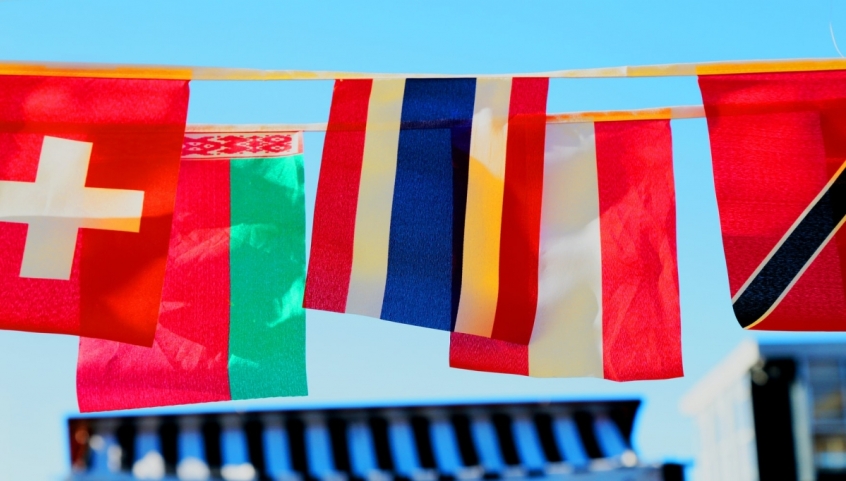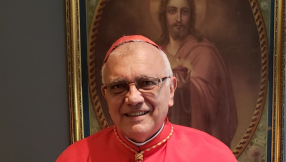
Christians have just celebrated Pentecost, also sometimes known as Whitsunday ('white Sunday') – a name almost certainly derived from the white garments worn by those in the medieval church baptised on this significant day.
Occurring on the seventh Sunday after Easter, it celebrates the outpouring of the Holy Spirit on the gathered followers of Jesus after his ascension. Our first record of it as a church festival dates from the second century.
The 'birthday of the church'
Christians, as we know, have different understandings regarding both the experience of the Holy Spirit and the nature, origins, and role of the 'church.' However, what many agree on is that Pentecost was, in effect, the 'birthday of the church.' As with so much in Christian history and biblical study that statement would not go uncontested. But it seems a fair assertion. The followers of Jesus, who had been devastated by his crucifixion, were revitalised by the experience of their Risen Lord on Easter Sunday and in the post-resurrection experiences; and were then radically empowered by what they experienced as they gathered during the Jewish 'Feast of Weeks' (Shavuot).
This understanding of the watershed moment of Pentecost is consistent with Jesus telling his disciples at his ascension: "not to depart from Jerusalem, but to wait for the promise of the Father, which, he said, 'you heard from me, for John baptized with water, but before many days you shall be baptized with the Holy Spirit'." (Acts 1:4–5 RSV)
Later on in the Acts of the Apostles, Peter got himself into trouble for mixing with, and baptising, non-Jews at Caesarea. The fact that they were members of the occupying Roman power can't have helped either, but it was their Gentile status that really caused the problem. In his defence, Peter explained to his critics that "the Holy Spirit fell on them just as on us at the beginning." (Acts 11:15)
It seems clear that he was thinking of what had happened to the Jewish followers of Jesus at Pentecost and which had now happened to a Roman centurion, his relatives and close friends (Acts 10:24-48).
It is reasonable to assume that the Greek word arche ('beginning') implies that the church (the community of Christian believers) effectively came into being at Pentecost. So, the phrase 'birthday of the church' seems a fair one to use in describing what occurred on that day. Others have traced its 'beginning' to different points, but I think that it is Pentecost that really marks the decisive occasion.
The gospel goes international
At Pentecost the followers of Jesus experienced empowering and this flowed out into proclamation. We are told that the dramatic experience of the Holy Spirit caused them to speak in other languages and a huge international crowd declared that "we hear them telling in our own tongues the mighty works of God." (Acts 2:11)
Now, this is not the place to discuss the different views that Christians have concerning the gifts of the Holy Spirit and specifically that known as 'speaking in tongues.' But what seems so striking in the passage from Acts is that it specifically refers to the communication of the message in a range of human languages.
Elsewhere we hear about the need for interpretation of "tongues" (for example in 1 Corinthians 12:10; 14:5) which sounds significantly different to what happened at Pentecost and reminds us of Paul's reference to speaking in the tongues of humans and of angels (1 Corinthians 13:1). Whatever we believe about this gift overall, it seems undeniable that at Pentecost the message went linguistically international. The text clearly states that the message was heard in the different languages of those present in Jerusalem.
That Peter specially referred back to it, when he defended himself on the matter of baptising Gentiles, underlines that assertion. While at Caesarea the message went international ethnically, this was a development of what had already occurred at Pentecost linguistically. So, at the beginning of the Christian church, the message went global and, as a consequence, national and ethnic barriers came down.
As Paul later put it: "Here [in the Christian community] there cannot be Greek and Jew, circumcised and uncircumcised, barbarian, Scythian, slave, free man, but Christ is all, and in all." (Colossians 3:11) In a community that was very conscious of the differences between 'citizens' and 'non-citizens,' 'civilised' and 'barbarian,' this was radical – to put it mildly.
It took the church centuries to face up to the implications of that belief regarding the institution of slavery. In a community where status in Christ transcended such a brutal barrier, the gospel was set on a head-on collision with the whole institution. No Christian today, I am relieved to say, would argue for the legitimacy of slavery, or its re-imposition. But for centuries huge numbers of believers were prepared to duck the implications of the radicalism implicit in the gospel message. So, what about national identity? What about nationalism?
The 'politics of Pentecost'
For many people, faith and national identity remain closely connected. As someone with an interest in, among other things, early medieval history, I am aware of the strong argument that the idea of 'English' identity was first developed by the Northumbrian monk Bede, as he sought to forge something recognisable (and Christian) from the mosaic of different ethnic and political groups around him in the eighth century. It is significant that he titled his book: 'History of the English Church and People.' At the time most people that he described as 'English' thought of themselves as Northumbrian, Mercian, West Saxon and so on. It reminds us of the saying that 'Ethnicity is made in the head, not in the womb.'
However, Bede's unifying strategy had its down side. He was equally determined to denigrate those who did not fit into his new structure and whose land had been conquered by the incoming Anglo-Saxons. This also applied to those he thought of as, in effect, 'the wrong kind of Christians.' When it came to members of what we now often call the 'Celtic Church' (a label they would not have used or understood) he was ready to recognise the contributions of Irish members but not of British ones.
Why? Because the British were ethnic and political rivals. Bede either wrote them out of history or set them up as sufficiently theologically flawed to justify their subjugation. He wrote approvingly of the slaughter of twelve hundred unarmed British monks at the battle of Chester. They were, to him, 'the wrong kind of people'; the 'wrong kind of Christians.' And yet Bede seems to have been a saintly man.
There is something deeply uncomfortable about that. One is reminded of those Hutu church leaders during the Rwandan genocide who revealed the whereabouts of Tutsi members of their congregations to the Hutu militias. The international nature of the church was compromised by their Hutu nationalism. Ethic and national identity can collide with the politics of Pentecost.
In the first half of the twentieth century, nationalism caused vast suffering across the world. Today, competing nationalisms are back – and in force. From the South China Sea, to 'America First' in the US, we have seen the world become increasingly fractious and inward looking. Now we even hear talk of 'vaccine nationalism.'
And it is easy to be critical of the nationalism of others, while defending one's own (which one usually describes with a less aggressive term). It is thought-provoking that Christians – members of the international, non-racial organization of the church – are more likely to "link national identity with ancestry" than non-believers do. Research in 2017, by the renowned Pew Research Center found that 67% of UK church-attending Christians thought this. The general population response was 58%.
This is not a solely UK phenomenon, as across Western Europe 72% of church-attending Christians (taking in both Catholic and Protestant nations) felt this (compared with a general population response of 53%). As the researchers concluded overall: "Christians as a whole in Western Europe tend to express higher levels of nationalist sentiment...at all levels of religious observance, these views are more common among Christians than among religiously unaffiliated people in Europe."
We should be concerned about that. We rightly celebrate the 20th century Christians who resisted rampant nationalism, while quietly forgetting the tens of millions who went along with it in its many forms, including its most extreme forms.
It's fine to love one's country and to be proud of its culture and achievements. I certainly do and am. But for Christians, national and ethnic identity takes second place to the internationalism of the gospel. As a result, believers must be at the forefront of international cooperation, reconciliation and presenting an alternative vision to the one so prevalent in our divided world. That is radical. It is counter-cultural. It always was. It is a message firmly rooted in the 'politics of Pentecost' and the world needs to hear it.
Martyn Whittock is an evangelical and a Licensed Lay Minister in the Church of England. As an historian and author, or co-author, of fifty-two books, his work covers a wide range of historical and theological themes. In addition, as a commentator and columnist, he has written for a number of print and online news platforms; has been interviewed on radio shows exploring the interaction of faith and politics; and appeared on Sky News discussing political events in the USA. His most recent books include: Trump and the Puritans (2020), The Secret History of Soviet Russia's Police State (2020), Daughters of Eve (2021) and Jesus the Unauthorized Biography (2021).













